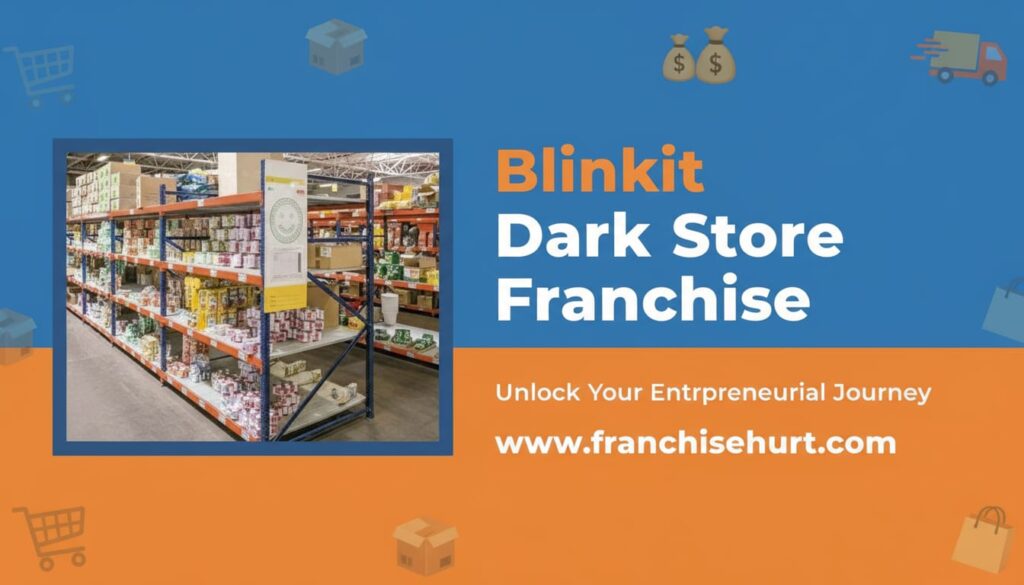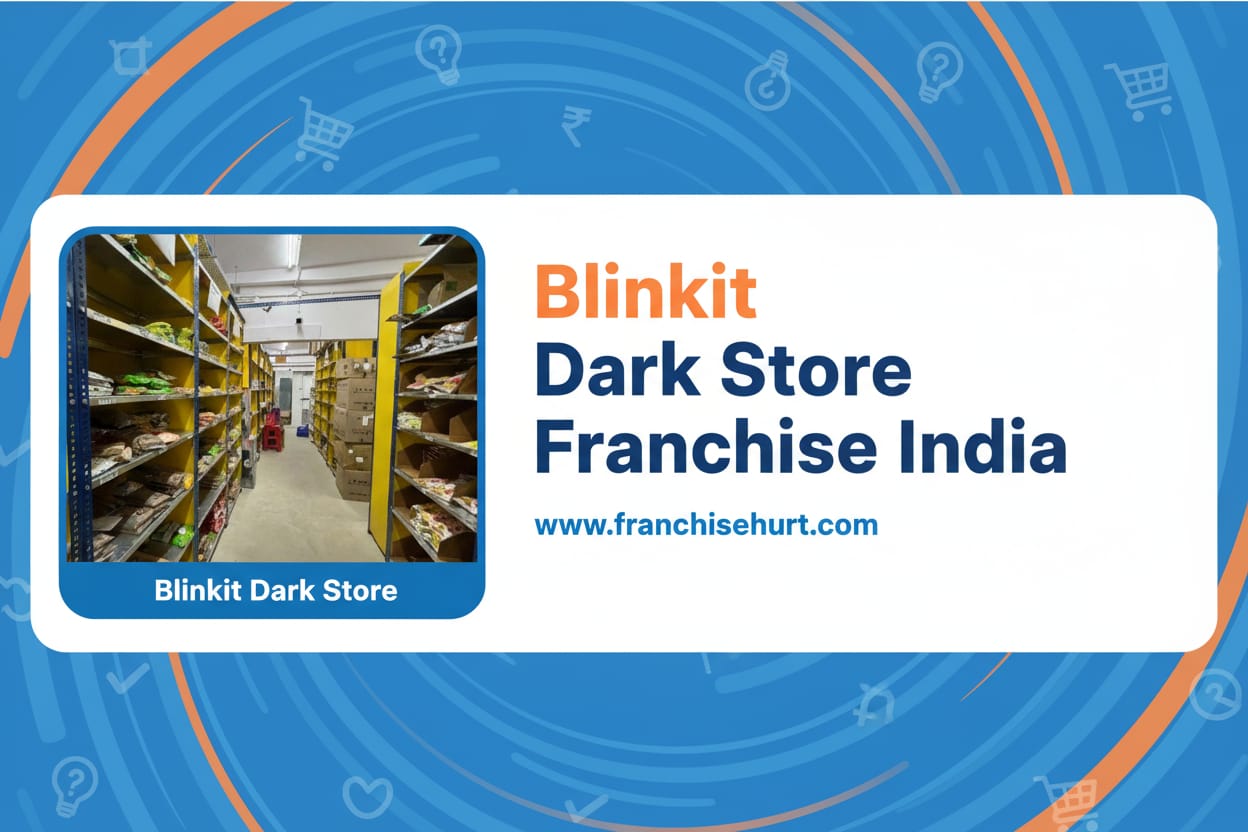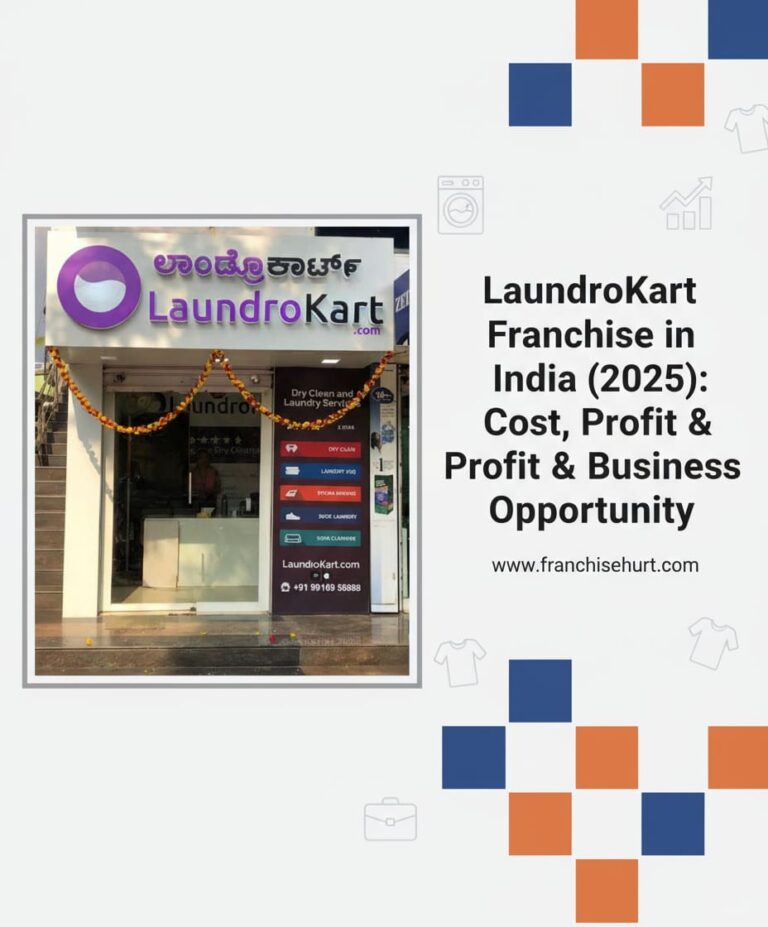Blinkit Dark Store Franchise in India (2025) – Low Investment, High Profit Quick Commerce Business

Quick Overview Table
| Feature | Details |
|---|---|
| Brand Name | Blinkit (formerly Grofers) |
| Founder | Albinder Dhindsa, Saurabh Kumar |
| Founded | 2013 (as Grofers), rebranded to Blinkit 2021 |
| Parent Company | Zomato (acquired in 2022) |
| Industry | Quick Commerce / Dark Store Grocery Delivery |
| Franchise Investment | ₹15–20 Lakhs (approx.) |
| Profit Potential | ₹1–2 Lakhs/month (approx.) |
| Payback Period | 12–18 months |
| Delivery Model | Dark stores & hyperlocal delivery |
| Offical Website | Apply Now |
Table of Contents
Introduction
Blinkit (formerly Grofers) is India’s leading quick commerce and grocery delivery platform, delivering essentials in 10–20 minutes through its innovative dark store model.
Blinkit’s dark stores are mini-warehouses in urban areas, designed to serve local neighborhoods quickly and efficiently. Entrepreneurs can now start a Blinkit dark store franchise in India to tap into the booming quick-commerce sector with low investment and high profit potential.
Founder Details
- Albinder Dhindsa: Co-founder & CEO, strategic growth leader.
- Saurabh Kumar: Co-founder, technology & operations expert.
Their vision of hyperlocal, rapid grocery delivery helped Blinkit scale quickly and attract Zomato’s acquisition.
Blinkit Dark Store Franchise Business Model
Blinkit runs on a dark store model, which is the core of its franchise opportunity:
- Urban Dark Stores: Mini-warehouses in residential or high-demand areas stocked with groceries and essentials.
- AI-Powered Order Management: Orders from the Blinkit app are automatically routed to the nearest dark store for packing and delivery.
- Hyperlocal Quick Delivery: Ensures customers receive products in 10–20 minutes, offering a competitive edge over traditional grocery stores.
- Real-Time Inventory Updates: Franchise owners manage stock efficiently with Blinkit’s software, reducing wastage and avoiding out-of-stock issues.
This model allows franchise owners to earn high profits with optimized operations and consistent order flow.
Also Read: Zepto Franchise in India (2025)
Unique Selling Proposition (USP)
- Ultra-Fast Delivery: Blinkit’s dark stores enable rapid 10–20 minute deliveries.
- Zomato-Backed Brand: Trust and reliability attract more customers.
- High Repeat Orders: Daily essentials drive recurring revenue.
- Tech-Driven Operations: AI-based order routing, inventory management, and delivery tracking.
- Comprehensive Support: Training and ongoing operational guidance provided to franchise owners.
Achievements
- Rebranded from Grofers to Blinkit in 2021 for better brand positioning.
- Acquired by Zomato in 2022, strengthening funding, infrastructure, and technology.
- Expanded to 25+ major cities in India within a decade.
- Recognized as a leading dark store quick-commerce player in India.
- Implemented sustainable packaging and eco-friendly delivery practices.
Why Choose Blinkit Dark Store Franchise?
- High-demand urban grocery delivery sector.
- Strong technology and operational support.
- Recurring daily orders ensure steady revenue.
- Trusted brand with Zomato backing.
- Training, onboarding, and continuous guidance.
Blinkit Dark Store Franchise Cost in India (2025)
| Expense Head | Estimated Cost (₹) |
|---|---|
| Franchise Fee | 50,000 – 1,00,000 |
| Dark Store Setup (1000–1500 sq.ft.) | 8 – 12 Lakhs |
| Inventory (Initial Stock) | 3 – 5 Lakhs |
| Equipment (Racks, Billing, Tech) | 2 – 3 Lakhs |
| Working Capital | 2 – 3 Lakhs |
Total Investment: ₹15–20 Lakhs (approx.)
Blinkit Franchise Profit Margin & ROI
- Average commission: 8–15% per order.
- Monthly revenue: ₹8–12 Lakhs depending on location & demand.
- Net profit potential: ₹1–2 Lakhs/month.
- Payback period: 12–18 months.
Profitability depends on city, population density, and operational efficiency.
Step-by-Step Daily Operations for Blinkit Dark Store Franchise Owners
- Order Management: Receive orders via Blinkit app and confirm them.
- Picking & Packing: Staff collects items from inventory and packs them efficiently.
- Delivery Assignment: Orders automatically assigned to nearest delivery partners.
- Delivery Tracking: Monitor order status in real-time using Blinkit dashboard.
- Inventory Updates: Track stock levels and restock popular items.
- Customer Support: Handle returns, complaints, and feedback promptly.
Tips to Maximize Profit from Blinkit Dark Store
- Strategic Location Selection: Urban areas with dense residential populations.
- Inventory Optimization: Keep high-demand essentials in stock.
- Participate in Promotions: Leverage Blinkit app campaigns.
- Staff Training: Efficient packing and delivery management.
- Tech Utilization: Use Blinkit dashboard for insights and performance tracking.
Eligibility Criteria for Blinkit Dark Store Franchise
To qualify for a Blinkit dark store franchise, applicants must meet the following criteria:
- Age: 21 years and above.
- Business Mindset: Willingness to manage inventory, staff, and operations.
- Financial Stability: Ability to invest ₹15–20 Lakhs (including store setup, inventory, and working capital).
- Location Availability: Space for a dark store (1000–1500 sq.ft.) in a high-demand urban area.
- Commitment: Full-time involvement or dedicated management for running the franchise efficiently.
- Technology Access: Basic familiarity with smartphones, POS systems, and online dashboards.
Documents Required for Blinkit Dark Store Franchise
To apply for a franchise, Blinkit typically requires the following documents:
- Identity Proof: Aadhaar Card, PAN Card, Passport, or Voter ID.
- Address Proof: Utility bills, rental agreement, or property ownership documents.
- Bank Statement: Last 6–12 months to show financial stability.
- Business/Legal Documents: If applying via a company or partnership, provide registration documents (GST, Firm Registration).
- Dark Store Ownership/Lease Documents: Proof of ownership or lease agreement for the proposed dark store location.
- Photographs: Passport-size photos of the applicant and key management personnel (if applicable).
Blinkit may request additional documents based on city and operational requirements during the verification process.
How to Apply for Blinkit Dark Store Franchise
- Visit the official Blinkit Partner Page: blinkit
- Fill the franchise inquiry form with personal and business details.
- Blinkit team evaluates your location and investment capability.
- Shortlisted applicants are contacted for agreement & investment discussion.
- Set up the dark store, train staff, and start operations under Blinkit branding.
Conclusion
The Blinkit dark store franchise in India (2025) offers a low-investment, high-profit opportunity in the booming quick commerce sector. With strong brand support, technology, and training from Zomato-backed Blinkit, franchise owners can enjoy steady revenue, recurring orders, and scalable business growth.
Entrepreneurs seeking a future-ready grocery delivery business should consider a Blinkit dark store franchise as a top choice in 2025.
Frequently Asked Questions(FAQs)- Blinkit Dark Store Franchise
1. What is the Blinkit dark store franchise fee?
Ranges between ₹50,000 – 1,00,000 depending on city.
2. How much investment is needed to start a Blinkit dark store franchise?
Around ₹15–20 Lakhs, including store setup, inventory, and working capital.
3. What is the profit potential of a Blinkit dark store franchise?
Net profits can range between ₹1–2 Lakhs/month depending on demand and location.
4. How long does it take to get ROI?
Typically 12–18 months with consistent operations.
5. Are prior business experience and technical skills required?
No mandatory experience, but management skills and commitment help.
6. What are the daily operational responsibilities?
Order management, picking & packing, delivery coordination, inventory updates, and customer support.







